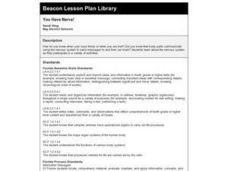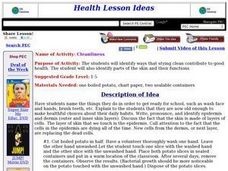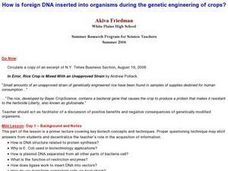Curated OER
You Have Nerve!
Fourth graders investigate the nervous system and how it communicates messages to and from the brain.
Curated OER
Respiratory and Circulatory Research Project
Students use the Internet and books to research the respiratory and circulatory systems. They also write a report on different diseases and present to the class.
Curated OER
Plant Life Cycle
Fourth graders explore the plant life cycle. They discuss the sequence of events in the life cycle of the plant and illustrate how the life cycle never ends. Students explore the importance of water, sunlight, and nutrients during the...
Curated OER
CLOTHESLINE SLEUTH
Young scholars will trace origins of various forms of clothing to their agricultural sources.String a cotton cord across the top of a blackboard to resemble a clothesline. 2. Bring a variety of clothing articles to class made from a...
Curated OER
Kwhl Chart
In this literacy worksheet, students use the created resources for further progress towards knowledge. The sheet is a teacher's guide for creating student resources.
Curated OER
Exploring our World through Video
Student develop their technology skills. For this video production lesson, learners create a movie featuring their day-to-day lives. Students use flip video cameras to film the movie and use software editing programs to prepare it for...
Curated OER
Taxonomy
In this biology worksheet, students complete a crossword puzzle with 39 questions on taxonomy. They identify the different classification systems used in biology.
Curated OER
Genes
Students explore the history, inheritance and mutations of genetics. In this genetic lesson students complete experiments on DNA sequences.
Curated OER
Making a Human Tree
Students explore botany by defining the anatomy of a tree. In this environmental exploration lesson, students research plant vocabulary terms and discuss the uses of each word. Students create a "human" tree by role-playing as one of the...
Curated OER
Introduction To Floral Morphology
Students create a model of the four basic whorls of flowers using a water bottle, construction paper and Q-tips. They then examine fresh flower specimens to see how the basic structure can vary in different species of flowering plants.
Curated OER
Blood Business
Students identify the different kinds of blood. In this biology lesson plan, students investigate the antigens, agglutinins and Rh factor using their own blood. They use Punnett squares to predict blood type of offspring.
Curated OER
Hazard Mitigation: Bioterrorism
Students discuss different ways to spread infectious diseases. In this bioterrorism lesson, students model the rate of smoke emission using CalRoad software. They analyze the effects of airborne release of biological...
Curated OER
Cleanliness
Students identify ways that staying clean contribute to good health. They perform an experiment involving potatoes and washed and unwashed hands, observing the results. They complete a cleanliness chart, checking off each healthful habit...
Curated OER
Reflexes
Learners experiment to explain how reflexes, nerve impulses travel to the brain.
Curated OER
What's it Like Inside the Sun?
Students perform experiment in which they model convection as it occurs in our Sun. They also explain that convection acts where the effect of gravity and heat are present (low density fluids can rise and cool, and high density fluids...
Curated OER
How is Foreign DNA Inserted into Organisms During the Genetic Engineering of Crops?
Students examine the positive benefits and negative consequences of genetically modified organisms following a lecture covering key biotech concepts and techniques. Students then conduct and experiment comparing the travel rate of...
Curated OER
Comparison of Four-, Six-, And Eight-bp Cuts in Calf Thymus Dna
Students investigate the use of restriction enzymes to recognize a four-, six-, and eight-nucleotide sequence. They utilize restrictive endonucleases to cut Thymus DNA and compare results by viewing the DNA fragments on Agarose Gel...
Curated OER
Super Scientists Bingo
In this science learning exercise, learners select twenty-five scientists from the list to fill in their bingo card. Then they match each of the scientists listed to their correct description strip.
Curated OER
Adaptations
Eighth graders choose an animal and research its various adaptations using
their information, 8th graders create an informational tri-fold brochure or newsletter. They should include facts about the animal's adaptations as well as...
Curated OER
GPS Receiver Basics
Students practice using a GPS receiver. They walk in different directions and monitor their progress on maps. They enter specific locations and use information given to them to get them back to their original locations.
Curated OER
Ladders of Life
High schoolers explore the field of genetics. They examine four basic traits. Students demonstrate their knowledge of phenotype and genotype by charting their personal traits. High schoolers compelte a Meiosis chart. From the chart...
Curated OER
Exploring Film Genres for Telling Hero Stories: Animated Shorts
Students will create short movies. The integration of technology into the curriculum is important for learners to apply in various ways. This instructional activity is an example of that kind of integration.
Curated OER
Poriferans and Cnidarians
Students study the major phyla of the animal kingdom. In this biology lesson unit, students identify their general characteristics. They define taxonomy terminologies.
Encyclopedia of Earth
Encyclopedia of Earth: Microbiology: Cells
Article describing the parts of a cell. Includes chart listing the main parts of a cell and their definitions. Discusses some of the ways a cell can become damaged. (Published: February 28, 2008)

























